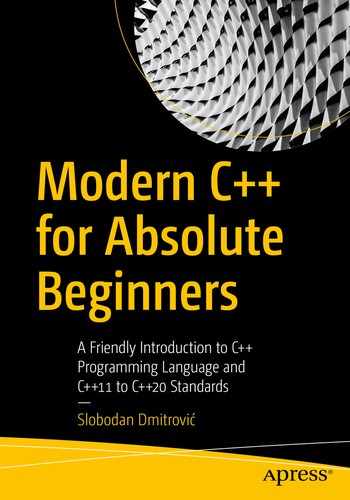36.1 static_cast Conversion
Write a program that uses a static_cast function to convert between fundamental types.
#include <iostream>
int main()
{
int x = 123;
double d = 456.789;
bool b = true;
double doubleresult = static_cast<double>(x);
std::cout << "Int to double: " << doubleresult << '
';
int intresult = static_cast<int>(d); // double to int
std::cout << "Double to int: " << intresult << '
';
bool boolresult = static_cast<bool>(x); // int to bool
std::cout << "Int to bool: " << boolresult << '
';
}
36.2 A Simple Unique Pointer:
Write a program that defines a unique pointer to an integer value. Use the std::make_unique function to create a pointer.
#include <iostream>
#include <memory>
int main()
{
std::unique_ptr<int> p = std::make_unique<int>(123);
std::cout << "The value of a pointed-to object is: " << *p << '
';
}
36.3 Unique Pointer to an Object of a Class
Write a program that defines a class with two data members, a user-defined constructor, and one member function. Create a unique pointer to an object of a class. Use the smart pointer to access the member function.
#include <iostream>
#include <memory>
class MyClass
{
private:
int x;
double d;
public:
MyClass(int xx, double dd)
: x{ xx }, d{ dd }
{}
void printdata()
{
std::cout << "Data members values are: " << x << " and: " << d;
}
};
int main()
{
std::unique_ptr<MyClass> p = std::make_unique<MyClass>(123, 456.789);
p->printdata();
}
36.4 Shared Pointers Exercise
Write a program that defines three shared pointers pointing at the same object of type int. Create the first pointer through an std::make_shared function. Create the remaining pointers by copying the first pointer. Access the pointed-to object through all the pointers.
#include <iostream>
#include <memory>
int main()
{
std::shared_ptr<int> p1 = std::make_shared<int>(123);
std::shared_ptr<int> p2 = p1;
std::shared_ptr<int> p3 = p1;
std::cout << "Value accessed through a first pointer: " << *p1 << '
';
std::cout << "Value accessed through a second pointer: " << *p2 << '
';
std::cout << "Value accessed through a third pointer: " << *p3 << '
';
}
36.5 Simple Polymorphism
Write a program that defines a base class with a pure virtual member function. Create a derived class that overrides a virtual function in the base class. Create a polymorphic object of a derived class through a unique pointer to a base class. Invoke the overridden member function through a unique pointer.
#include <iostream>
#include <memory>
class BaseClass
{
public:
virtual void dowork() = 0;
virtual ~BaseClass() {}
};
class DerivedClass : public BaseClass
{
public:
void dowork() override
{
std::cout << "Do work from a DerivedClass." << '
';
}
};
int main()
{
std::unique_ptr<BaseClass> p = std::make_unique<DerivedClass>();
p->dowork();
} // p1 goes out of scope here
Here the override specifier explicitly states that the dowork() function in the derived class overrides the virtual function in the base class.
Here we used the unique pointer to create and automatically destroy the object and deallocate the memory one the pointer goes out of scope in the main() function.
36.6 Polymorphism II
Write a program that defines a base class with a pure virtual member function. Derive two classes from the base class and override the virtual function behavior. Create two unique pointers of base class type to objects of these derived classes. Use the pointers to invoke the proper polymorphic behavior.
#include <iostream>
#include <memory>
class BaseClass
{
public:
virtual void dowork() = 0;
virtual ~BaseClass() {}
};
class DerivedClass : public BaseClass
{
public:
void dowork() override
{
std::cout << "Do work from a DerivedClass." << '
';
}
};
class SecondDerivedClass : public BaseClass
{
public:
void dowork() override
{
std::cout << "Do work from a SecondDerivedClass." << '
';
}
};
int main()
{
std::unique_ptr<BaseClass> p = std::make_unique<DerivedClass>();
p->dowork();
std::unique_ptr<BaseClass> p2 = std::make_unique<SecondDerivedClass>();
p2->dowork();
} // p1 and p2 go out of scope here
36.7 Exception Handling
Write a program that throws and catches an integer exception. Handle the exception
and print its value:
#include <iostream>
int main()
{
try
{
std::cout << "Throwing an integer exception with value of 123..." << '
';
int x = 123;
throw x;
}
catch (int ex)
{
std::cout << "An integer exception of value: " << ex << " caught and handled." << '
';
}
}
36.8 Multiple Exceptions
Write a program that can throw integer and double exceptions in the same try block. Implement the exception handling
blocks for both exceptions.
#include <iostream>
int main()
{
try
{
std::cout << "Throwing an int exception..." << '
';
throw 123;
std::cout << "Throwing a double exception..." << '
';
throw 456.789;
}
catch (int ex)
{
std::cout << "Integer exception: " << ex << " caught and handled." << '
';
}
catch (double ex)
{
std::cout << "Double exception: " << ex << " caught and handled." << '
';
}
}
